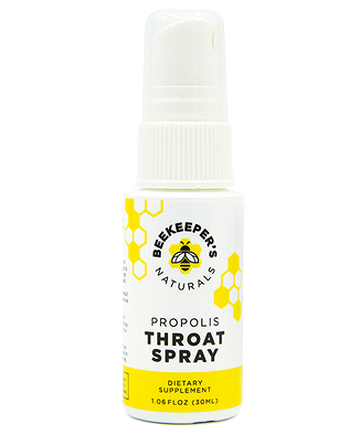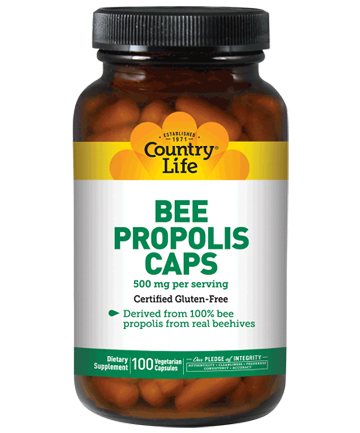Though they're best known for the fact that they produce honey and, well, can sting you, bees actually create a ton of things that are super beneficial to humans (and bees, of course). "Besides honey, bees make some other wonderful and unique substances, like royal jelly, bee pollen and propolis," says Carly Stein, CEO and founder of Beekeeper's Naturals. "Propolis is a slightly bitter collection of powerfully healing plant and tree resins that are gathered and processed by bees."
"Propolis has well documented germ-fighting properties and is rich in antioxidants as well as hundreds of beneficial plant compounds – bees line every inch of their hives with this sticky stuff to keep things clean and germ-free; it's pretty much their built-in immune system," adds Stein. "They even keep what is essentially a propolis doormat by the hive entrance to ensure no one tracks in any nasties!" And, if they do, Dr. Noah Wilson-Rich, the founding partner and chief scientific officer at The Best Bees Company says that bees can self-medicate by adding more propolis inside their nest after exposure to a disease-causing fungus.
Image via Imaxtree
Thanks to its numerous beneficial properties, many experts consider propolis the OG antibiotic. "The rich antioxidant content of propolis helps the body fight free radicals and soothe inflammation, which takes a major load off our immune systems, but what makes propolis unique is its diverse array of healing phytochemicals, like flavonoids," says Stein. "Containing over 300 beneficial compounds, research has shown that propolis possesses impressive anti-bacterial, anti-viral, anti-fungal, and potentially even anti-cancer properties."
While it's still far from mainstream in the U.S. it has deep roots — roots that go back millennia, in fact: Both Hippocrates and Pliny the Elder recommended it for healing various ailments, like ulcers, colds and wounds and according to Stein, it was also a beauty fave of Cleopatra, who used it to firm and clarify her complexion. "The ancient Egyptians even used it in the mummification process to seal things up and prevent the spread of bacteria," she explains.
To this day, it's still widely used in alternative medicine. "When I had the opportunity to visit with beekeepers of the Samburu Tribe in northern Kenya, I noticed that many were using propolis as a chewing gum to heal mouth ulcers," says Wilson-Rich. "The exact mechanisms of action for boosting immune function are still not well known at this time and warrant further study."
As far as the present day U.S. goes, the stuff still has niche appeal as an all-purpose remedy. These days, propolis is mostly marketed for natural immune support and is found in throat sprays, honey, toothpaste and mouthwashes.
Other benefits include the fact that honey has low oxygen, high sugar and low pH, which helps prevent bacterial infections that require oxygen (such as MRSA), according to Wilson-Rich. "Honey is also used for facial treatments to reduce aerobic bacterial loads and clear up complexion, but out of all the bee products that improve human health, it's actually venom that has the most benefits. Lip plumpers and skin firmers are common examples of this natural product in cosmetics."
For her part, Stein singles out royal jelly as being another notable bee product. "Bees make this divine substance known as royal jelly, which I like to think of as a brain-boosting longevity elixir. As the exclusive food source of the queen bee and newborns, it's a powerful hive superfood. Royal jelly contains high amounts of proteins, lipids, vitamins, enzymes and minerals — and its impressive nutrient density has not been able to be replicated by science. For humans, royal jelly is great for naturally supporting memory, concentration and focus."
If you're interested in learning more about bees and their many beneficial by-products, Wilson-Rich suggests doing some supplementary reading. "Check out the latest manuscript from our 501(c)3 nonprofit Urban Beekeeping Laboratory about Apitherapy in the journal Frontiers in Ecology and Evolution where we review the ways in which bee products help human health. There are six bee products total — honey, beeswax, propolis, venom, royal jelly and pollen," he says.
Having highlighted these amazing benefits it's important to remember that bees are currently in massive danger.
"Anyone who eats food needs bees because they pollinate over 70 fruit and vegetable crops that we rely on for healthy eating," says Wilson-Rich. "Bees also pollinate hay and alfalfa crops that feed our cattle industry yet over 40 percent of all honey beehives die in the U.S. each year, and that amount is even higher in areas with harsh winters. Can you imagine if we lost 40 percent of people annually, and if those were the food-producing people? It's untenable for the survival of humanity."
Image via Konrad Wothe/Lookphotos/LOOK/Getty









